- Home
- Lisa Wingate
Dandelion Summer Page 36
Dandelion Summer Read online
Page 36
“Hey!” Russ stepped between us, his palms going out like stop signs, his eyes flashing wide. “Hey! Now, I said we’re not gonna fight.”
Taking a step back, Mama threw a hand over her eyes, fingers trembling. She sniffled, pushed her lips together, and swallowed hard. “Tell her that,” she said finally, her voice shaking, her shoulders stiff. She dropped her hand, and her eyes were hard and cold. “What do you want from me, Epie? Why can’t you ever just leave it alone? Why does it always have to be like this?” Her arms flew out, her hands fanning the air, as she screamed, “What do you want!”
Something broke loose inside me, rushed forward like a wild animal kept caged too long, finally seeing open ground. “I want you to stop being mad at me! I want you to stop hating me for who I am. I want you to tell me I’m smart, and I’m pretty, and I can do things. I want you to be my mama. I want you to stop lying to me. I want to know about my father.”
Mama let out a gasp, gritting her teeth, but I kept on before she could say anything. It was now or never. If she kicked me out, I’d go to J. Norm’s house, grab the hidden key, and let myself in. Either way, I’d get at least some of what I wanted. “I want to know who my father was. I want the truth! I know he has people out there. I saw the pictures—the ones you keep hidden in that shoe box. They loved me. They wanted me, and you took me away, didn’t you? Didn’t you?”
“Ffff!” Mama spat. “They wouldn’t even help us when we needed it. Want you? They were ready to let us starve on the street. That’s how much they wanted you.” Yanking open a kitchen drawer, she started digging through scissors, old notepads, dried-up ink pens, twist ties, rubber bands, and other junk. Finally, she pulled something from the bottom of the drawer, spun around, and flung it at me. It hit my knee and landed on the ground by my feet. A little book, not much bigger than a credit card, tattered and yellowed, the kind you get free from the bank or an insurance company. “There! There, you happy now? You ready to get off my back, to quit making me out like the terrible mother? Mean, horrible Mama. You’ve even turned Russ against me. All you ever do is try to screw it up for me. You never think of anybody but yourself, Epiphany. Just go ahead and try calling your daddy’s family. See how far it gets you. See how much help you get out of that self-righteous bunch of witches!” She turned around and stomped out of the kitchen. Her bedroom door slammed a few seconds later.
I picked up the book. Inside, there were addresses and phone numbers, the ink faded, the names written a long time ago. They were notes from another life—places in Tampa, Florida. A bank, a church, a dentist, an entry marked, Epiphany’s pediatrician, and then in the “J” section, a half dozen people with the same name as my father, Jones, including one that just said, Nana Jones. I stood there looking at it, trying to get my mind around the idea that, after all this time, their names, my history, were right there in my hands. It’d been stuffed in the junk drawer all this time. They were just a phone call away.
Now that the truth was so close, I was scared. What if Mama was right? What if they didn’t want me? What if there was something horrible in my past, just like we’d found in J. Norm’s? Maybe I was better off not knowing.
Russ sighed and started for the door. “I better go talk your mama down.” He sounded tired. On the way past, he stuck his hand in his pocket, then pulled out his phone and handed it to me. “You can use it if you want.”
I didn’t, though. I wasn’t sure why, but I put Russ’s phone and the book in my pocket, and I just kept them there. In the bedroom, I heard Mama sobbing, and I felt bad, because I knew that, whether she’d ever say it or not, I’d hurt her. She cried all the while I was cleaning up the dishes from the lunch we never ate. The three slices of cake were still on the table. I stared at them for a minute, remembering that she’d been excited about the free dessert.
When Mama came out of the bedroom again, we didn’t talk. She had a couple hours until she needed to go to work, and we sat in the living room, watching old reruns on TV and eating our slices of cake, while Russ disappeared outside.
Mama didn’t ask about the book, and I didn’t tell her where it was. When she left for work, she stood in the door for a minute, then grabbed her keys off the table and said, “It’s a short night. I won’t be so late.”
“ ’Kay,” I whispered, and I wondered why sometimes the people you wish you could understand the most are the ones you can’t understand at all.
After Mama left, I went back to the bedroom and got out the box, then laid the pictures on the bed and looked hard at them. I looked into the eyes of those women, and I saw pieces of myself. I looked into Mama’s eyes, and I saw myself there, too.
And I saw Cecile. I saw her in those beautiful black women, in their fancy church hats and their Jackie Kennedy dresses. In my mind, I decided that Cecile had moved far away from the house with the seven chairs. She’d moved to St. Louis after she made sure all those little redheaded children had a place. She’d made a whole new life for herself, a happy life. And maybe, because she’d done something good for them, those rich families who got the children had kept sending her a little money over the years, just to make sure she was taken care of. On Sundays, she put on a big hat, and a beautiful dress, and clean white gloves, and sang praises louder than anybody else.
That’s what I’d say in my essay about To Kill a Mockingbird, I decided. I’d make sure the English teacher knew that the story of Jem and Scout and Atticus Finch wasn’t just words someone made up in a book. There were people who lived it—people of all different colors. They were brave, and they were strong, and even though it was hard, they did what they knew was right.
I’d tell her about Cecile, because a story like that ought to be told.
And I’d tell her my story. I’d tell her how, after I looked at those pictures long enough, and opened and closed the address book a half dozen times, and picked up the phone and set it down over and over, I finally thought about Cecile. She was just some girl who cleaned the house, but she saved those five little kids when everyone else in town was afraid to.
Sooner or later, if you want to do what’s never been done, you have to find the courage to take the first step. Just like J. Norm said, Only impossible journeys achieve the impossible.
That’s what I’d tell the English teacher.
And then I’d tell her that I picked up the phone, and I dialed the number for Nana Jones. My hands were shaking when I pressed the phone to my ear. I held my breath, waited through one ring, two, three, almost hung up in between each. My heart was pounding so hard, I couldn’t think. I wouldn’t know what to say if someone answered. . . .
And then someone did—an old woman. She had a nice voice. “Hello?” she said once, and then again, after I didn’t speak.
I pushed a hand to my chest, tried to hold my heart inside. “Hello . . . is this . . . is this Mrs. Jones?”
“Yes, it is. May I help you?” she said in a way that wasn’t rude really, but told me to get to the point.
“Hi.” My throat clutched the word, like a fist squeezing so tight the muscles trembled. I felt myself breaking open, thinking, Just hang up the phone.
I heard Mama’s voice saying, Want you? They were ready to let us starve on the street. That’s how much they wanted you.
Tears pushed into my eyes.
“Hello? Is somethin’ wrong? Is ever-body okay?” The woman on the phone sounded old-fashioned and Southern, like Aunt Char at the bed-and-breakfast.
Just hang up the phone.
And again I thought of Cecile. I saw the smoke billowing all around her, the heat licking at her skin as she squeezed through the ash door.
I thought of J. Norm, sending his rockets to the moon, past the Russian trawlers with their signal jammers, and all the people who said the moon was covered in five feet of dust, everyone who said it couldn’t be done. Maybe, even though J. Norm didn’t know it, when the rocket left Earth, he was hearing Cecile’s voice, too. Maybe she was telling him never to let other peo
ple tell you when to give up hope.
I swallowed hard, took a breath. “Hello.” The word was faint at first, then stronger. “This is Epiphany. Epiphany Jones . . .”
Chapter 25
J. Norman Alvord
A midsummer rain had just stopped falling. It shone against the grass and glimmered on the pavement, giving the world a freshly washed look as Terrence’s car turned into the drive. Evening sunlight streamed beneath the shelf of clouds, reflecting against the vehicle’s sleek metal skin.
I watched from the parlor window as Epiphany stepped out, slinging her backpack onto her shoulder. She stopped to say thank-you to Terrence, and to Terrence’s daughter, Dell, as they exited the front seats, and then, impulsively, she gave each of them a hug. Terrence and his daughter smiled at each other and then started up the stairs to his apartment, Terrence keeping a hand under Dell’s elbow as she balanced the weight of a pregnancy. Watching them, I remembered the house on Switch Grass Island, where the swelter of summer days left Annalee, then round with life, exhausted after strolls along the shore. I held her arm as we walked up the stairs to our porch above the water, and she huffed and puffed, laboring with each step.
I’d probably never shared that story with Deborah. Tonight, when all the festivities were over, I would ask Deborah and Lloyd to stay over a little while before they headed home. I’d make some coffee— decaf, of course, because a man with much to do must look after his health. Over coffee later, I’d share the stories of Switch Grass Island with my daughter. It was as much her story as mine, after all.
It was also our story.
I moved to the door and opened it as Epiphany stepped onto the porch. Blinking, she registered surprise, then frowned at my comfortable clothing—the old brown polyester pants and a striped button-up shirt that, for some reason, women found distasteful. “You’re going in that?”
“Hello to you, too.” I did my best to appear offended, but on a day like this one, smiles pull from the inside, making a curmudgeonly countenance difficult to maintain. “You don’t appear to be ready, either.” I pointed at her jeans and a T-shirt with some hideous rock star on the front.
Slipping through the door, she dropped her backpack in the hall. “I brought all my stuff so I could get ready here. I figured if I hung around home too much, Mama would change her mind and tell me I couldn’t go.”
“Oh, I don’t think so,” I said, trying to smooth things, but Epiphany could be right. Her mother was a difficult woman, filled with her own jealousies and resentments. Even though I’d been much more cooperative since she’d returned to keeping house for me, I’d been unable to warm her up very much. The breach between her and Epiphany might never be fully healed, but who could say? Deborah and I stood as a testament to the fact that what is broken can sometimes be mended a bit at a time.
“You didn’t see the mood she’s in. I had to clean the whole stupid house to get out of there,” Epiphany complained, and then offered a one-sided smirk that reminded me she was still a teenager.
“Did you help to create the mess in the house?” I asked.
She narrowed her eyes. “Don’t even take her side, J. Norm.”
“It was just an observation. Stirring up the waters is hardly a help in building a bridge, now, is it?”
“Look who’s talking.” Incredulous eyes regarded me from beneath lowered lashes. “You been using the walker, like Deborah told you to? Because I don’t see it around here.” She made a show of peering into the front parlor and checking behind my back, as if that insidious four-wheeled rabbit cage might be there. Deborah was overreacting in her fear that I wasn’t yet steady enough on my feet.
“I’m fit as a fiddle.” I patted my plumper stomach. Those lunches out with Deborah and Epiphany’s dinners four days a week were starting to add up. Deborah was pleased, of course. “This new pacemaker has me in such good shape that I even went out and filled the bird feeders yesterday.” Afterward, I’d sat on the patio and watched the songbirds come in, and felt as if Annalee were there in the chair beside me.
Epiphany drew a breath, scandalized. “J. Norm! Teddy could’ve come over and done that, or Terrence.”
“Terrence has company, and besides, I wanted to do it myself. It’s my house, after all.”
Grabbing the backpack again, Epiphany rolled her eyes. “Geez, J. Norm. Somebody needs to be here to keep you out of trouble twenty-four /seven. Next time, let me do the bird feeders, or Deborah.”
It occurred to me then that if Deborah found out I’d been filling the feeders, we’d end up having a discussion over it. “If she notices them next time she comes, tell her you filled them.”
My request was answered with the measured look of a poker player gauging bids across the table. “Only if you promise to let me do it next time. You have to get on a ladder to reach those things, J. Norm.”
“Only one step.”
“Do you promise or not? Because I told you I wasn’t helping you hide stuff from Deborah anymore.”
“All right. I promise.” Too many women in a house makes misery for a man. Misery, or perhaps a lively challenge to the power of old age and treachery.
Moving to the end of the hall, Epiphany looked both ways. “Where is Deborah, anyway? I thought she’d be here by now. Sorry I’m so late, by the way. When Dell and Terrence picked me up, Russ dragged them to the carport to show them his Harley, and then him and Terrence got to talking bikes. I thought poor Dell was gonna have her baby right there on the street before they got done. Mama wouldn’t even come out and say hi, of course.”
“Let’s not complain about Mother today, all right?” I urged gently. Perhaps Epiphany’s mother had come as far as she was willing, or as far as she could at this juncture. One thing that discovering my own history had taught me is that we must learn not to whip ourselves for the failures of others. When a mother cannot love and protect her children, it is not the children who are defective. I had a sense that if I could help Epiphany to understand at least that much, I’d be adequately fulfilling this late-in-life task I’d been given. “Deborah and Lloyd will meet us at the dinner. They had to go to the airport.”
Epiphany’s eyes sparkled with enthusiasm. “You mean I get to drive? Just you and me?”
“Just like old times.”
She wiggled in place like an overwound toy, and I felt like jittering along with her. I thought better of it, however. Given my luck, I’d fall and prove Deborah right about the walker.
“Cool!” Her high-pitched squeal vibrated through the entry hall and might have shattered the crystal in the dining room. Suddenly in a rush, Epiphany headed for the stairs. “I gotta go get ready.”
“Hold on,” I said, and then felt the need to correct her. “You have to go get ready.”
“Right. I have to.” She turned toward the stairs again.
“I’ve moved my things to the powder room off the kitchen,” I told her before she could flit off. “You can use the bathroom in the master suite. Annalee always loved her vanity area and the full-length mirrors in there. She left some paraphernalia in the closet you might want to use.”
Spinning around with her mouth agape, Epiphany staggered off the bottom step. “You mean . . . the . . . I can . . . Like . . . the shoes . . . and . . .” She caught my gaze with intensity, waiting for me to explain myself.
“We are going to the sort of place where one dresses for dinner. Take anything you like from Annalee’s closet.”
Epiphany looked down at her clothing, smoothing the front of her T-shirt self-consciously. I could only imagine what she had in the backpack. “Meaning more than just changing into jeans without holes and a clean pair of flip-flops,” I added.
Looking down at her feet, she wiggled her toes. “Where are we going, anyway?”
“Someplace . . . fitting the occasion. It’s a big night.”
A dark brow arched upward. “Not someplace over by the airport, I hope. Because I’m scared of the airport.”
Stand
ing there, she seemed so young. Too young to be flying off to Florida for a monthlong visit with family members she’d never met. I’d made a few arrangements to be certain she was looked after, though. I still had friends in Florida from my days at the cape. “You’d best get used to it, if you’re to be flying out next week.”
“I’m not scared to fly. I’m just scared of the trip to the airport. Russ’s taking me. Actually, me driving might be safer than riding with Russ.”
“Highly unlikely.”
“Thanks a lot.” She gave a sardonic smirk, then hitched up the backpack and darted off, her voice echoing behind her. “I gotta get dressed! This’ll take a while!” She disappeared down the hall with the speed reserved for the young and nimble.
Despite being old and far from nimble, I proceeded on to my designated bathroom, and was dressed and ready long before Epiphany. I paced the living room, turned on the television, flipped through the channels, tried to watch, but my mind was rumbling like a rocket on the launchpad just before liftoff. I couldn’t remember the last time I’d felt such anticipation—perhaps in the moments after Surveyor left for the moon, or when the astronauts of Apollo 13 splashed down, alive and well. Yet perhaps even those days didn’t compare to this one. This day was not of my own making, but an act of God, the sort that cannot be questioned or denied, but only observed with a profound sense of awe.
When I heard Epiphany’s steps in the south hall, I rose and met her in the entryway, near the bottom of the stairs. She paused in the shadows of the corridor, shrinking into herself, lifting her hands palms up, her nose crinkling. “Is it okay, do you think?”
I smiled as she stepped into the light, slightly unsteady in a pair of sequined silk sandals Annalee had purchased at a market in Morocco. To go with the shoes, Epiphany had chosen a cocktail dress in red satin and black lace, something Annalee had worn with a sweater at Christmas, when Roy played with a jazz quartet at a charity ball. I couldn’t remember anything else about the dress except that Annalee wore it on that happiest of happy nights, one of our last holidays with Roy. “I think it is perfect,” I said to Epiphany. “Annalee would be so pleased.”

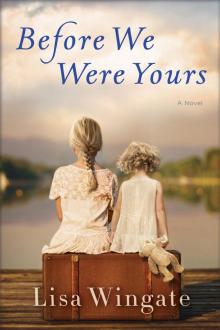 Before We Were Yours
Before We Were Yours A Sandy’s Seashell Shop Christmas
A Sandy’s Seashell Shop Christmas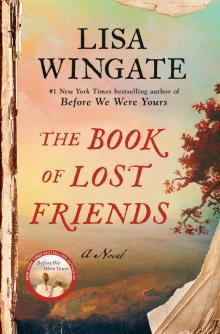 The Book of Lost Friends
The Book of Lost Friends Larkspur Cove
Larkspur Cove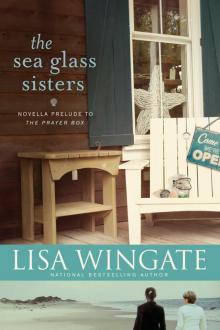 The Sea Glass Sisters
The Sea Glass Sisters The Language of Sycamores
The Language of Sycamores Dandelion Summer
Dandelion Summer Word Gets Around
Word Gets Around Beyond Summer
Beyond Summer Firefly Island
Firefly Island The Tidewater Sisters: Postlude to The Prayer Box
The Tidewater Sisters: Postlude to The Prayer Box Talk of the Town
Talk of the Town![Blue Sky Hill [01] A Month of Summer Read online](http://i1.bookreadfree.com/i1/03/29/blue_sky_hill_01_a_month_of_summer_preview.jpg) Blue Sky Hill [01] A Month of Summer
Blue Sky Hill [01] A Month of Summer A Thousand Voices
A Thousand Voices Over the Moon at the Big Lizard Diner
Over the Moon at the Big Lizard Diner Never Say Never
Never Say Never Good Hope Road
Good Hope Road The Summer Kitchen
The Summer Kitchen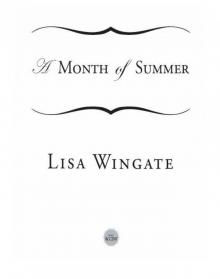 A Month of Summer
A Month of Summer Blue Moon Bay
Blue Moon Bay Drenched in Light
Drenched in Light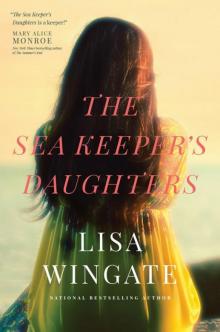 The Sea Keeper's Daughters
The Sea Keeper's Daughters